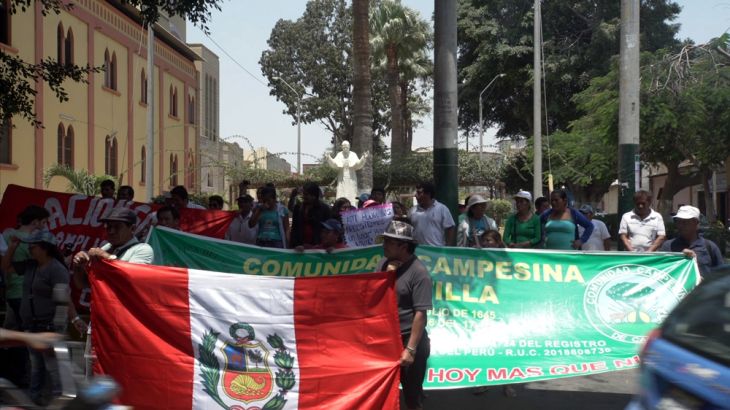
Peru: The Sodalitium Scandal
Investigating allegations of corruption involving one of Latin America’s wealthiest Roman Catholic societies.
The leaders of the Sodalitium of Christian Life, a secretive sect within the Peruvian Catholic Church, were accused last year by 30 former followers of physically, emotionally and even sexually abusing them, some while they were still children.
Now, this controversial sect is accused of paying a criminal gang to kick ordinary people off their land in a bid to build a billion-dollar property empire in the north of Peru.
Keep reading
list of 4 itemsUS sanctions two RSF commanders as fighting escalates in Sudan’s Darfur
The Lost Souls of Syria – Part 1
Is the US shipping weapons to Israel tacit support for its war on Gaza?
We sent Daniel Yovera, one of Peru’s top investigative reporters, to dig into these allegations.
FILMMAKER’S VIEW
By Seamus Mirodan
Nine out of 10 Peruvians consider themselves devout Catholics and although the state is constitutionally secular, the influence of the Church can be seen everywhere, in every walk of life. While we were filming, even the Ministry of the Interior building in the capital city Lima honoured the national religion on billboards hung across its entrance.
Occupying such a central and important role in the daily life of Peru’s citizens affords those who form part of the Church hierarchy unrivalled authority and respect – a fact that makes it all the more shocking and worrisome when some members of the clergy and their adherents face allegations of abuse and criminality.
One of Catholicism’s key teachings is that it is the duty of all who practise the faith to look after the poorest and most vulnerable in society. “It is easier for a camel to pass through the eye of a needle then for a rich man to enter my father’s Kingdom,” Jesus teaches his followers in the Bible, “it is the meek who will inherit the earth.”
So when the Sodalitium of Christian Life, a sect within the Peruvian Catholic Church, was accused of paying a criminal gang to move poor farmers off their land in a bid to create a highly profitable property business, it was clear that these allegations warranted further investigation. It was with this in mind that Peruvian reporter Daniel Yovera and I teamed up and travelled to the northern city of Piura to investigate these alleged land grabs.
The Sodalitium has long been mired in controversy. Founded in Lima in 1971, the group was part of the wider reaction by conservative Catholics to the ideas of the liberation theology movement, then becoming a powerful force across Latin America, in which radical priests joined forces with left-wing militants in pressing for social change.
But the Sodalitium’s activities and thinking went much further than other “traditionalist” religious groups; its founders openly sympathised with fascist ideology and from the beginning it drew its members almost exclusively from the ranks of Peru’s European-descended middle and upper classes – the richest, most powerful families in the land. While this increased the group’s influence, not just in religious circles but in political and financial spheres too, it also helped create an elite cadre of members which – according to allegations that first began surfacing in the 1990s – became involved in the brainwashing of successive generations of young recruits.
When these claims first appeared in the Peruvian media they gained little traction, but last year that all changed when a former follower of the group, Pedro Salinas, published a book based on accounts by 30 former members who alleged that they had been subjected to physical, psychological – and in some cases sexual – abuse.
Since the book’s release, dozens more complainants have come forward and five former members of the sect are now trying to hold it to account in the courts. They filed a lawsuit in which they accused the Sodalitium’s leaders of kidnapping, assault and criminal conspiracy; crimes which if proved could be punished by jail terms of up to 30 years under Peru’s penal code.
But now, perhaps even more bizarre and disturbing accusations are emerging, that Sodalitium members have also conspired with a notorious Peruvian organised crime gang, known as The Great Cross of the North, to evict ordinary people from their land in order to make way for a billion dollar real estate project.
During the course of our investigation, we spoke to at least a dozen individuals, mostly poor farmers or “campesinos”, who claimed to have been violently ejected from their property or to have witnessed incidents when this had happened – and all of them told us they believed this was consequent on the gang’s links to the Sodalitium, its related businesses and a vast new property development known the Miraflores Country Club.
According to some of these sources there were occasions when employees from businesses owned by Sodalitium were present during, or just before, the Great Cross of the North’s violent attacks on farmers and their families.
The claims were supported by testimony from a former senior ranking police officer, who had led an investigation into the Great Cross of the North that resulted in the arrest of the gang’s leaders in 2014. He gave us documents which showed that members of the Sodalitium had paid the gang, and even that one prominent member of the organisation was arrested while directing gang members to commit acts of violence.
And as we delved further, it became clear that whatever its original intentions, the Sodalitium of Christian Life had been acting in a markedly unchristian way, with practices so out of step with the teachings of Catholicism that perhaps it is now time for the Vatican to revisit its relationship with the sect and decide whether it wants to continue an association at all.